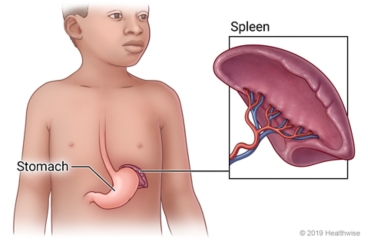Splenectomy in Children: Before Your Child's Surgery

What is a splenectomy?
A splenectomy (say "splih-NEK-tuh-mee") is surgery to take out the spleen. The spleen is an organ in the upper left side of the belly. It filters old and damaged blood cells from the blood. The spleen may need to be removed if it doesn't work well because of an infection like pneumonia. Sometimes it's removed because it was injured in a crash or a fall.
Your child will be asleep during the surgery. The surgery may be done through one large cut (incision). This is called open surgery. Or your child may have laparoscopic surgery. To do this, the doctor puts a lighted tube, or scope, and other tools through several small cuts.
Open surgery will leave a scar on your child's belly. Laparoscopic surgery leaves small scars. They will fade over time.
The spleen helps protect your child from illness. After the spleen is gone, your child may be more likely to get infections such as pneumonia and meningitis. So before or soon after surgery, your child may need one or more vaccinations.
Your child may need to take antibiotics for a while after surgery. Your child may also need to take them each time your child has a fever. This could be a sign of a serious infection. Ask the doctor what to do if your child has a fever.
How do you prepare for surgery?
Surgery can be stressful for both your child and you. This information will help you understand what you can expect. And it will help you safely prepare for your child's surgery.
 Preparing for surgery
Preparing for surgery
- Ask the doctor if your child needs any vaccines before surgery. The spleen helps the body fight certain types of bacteria. After the spleen is removed, your child's body will be less able to fight certain serious infections.
- Understand exactly what surgery is planned, along with the risks, benefits, and other options.
- Tell the doctor ALL the medicines and natural health products your child takes. Some may increase the risk of problems during the surgery. Your doctor will tell you if your child should stop taking any of them before the surgery and how soon to do it.
- Talk to your child about the surgery and what will happen. Healthcare providers know how to take care of children. They will do all they can to make it easier for your child.
- Plan for your child's recovery time. Your child may need more of your time right after the surgery, both for care and for comfort.
The day before surgery
- A nurse may call you (or you may need to call the hospital). This is to confirm the time and date of your child's surgery and answer any questions.
- Remember to follow your doctor's instructions about your child taking or stopping medicines before surgery. This includes over-the-counter medicines.
What happens on the day of surgery?
- Follow the instructions exactly about when your child should stop eating and drinking. If you don't, the procedure may be cancelled. If your doctor told you to have your child take any medicines on the day of the procedure, have your child take them with only a sip of water.
- Follow the doctor's instructions about when your child should bathe or shower before the procedure. Do not apply lotion or deodorant.
- Your child may brush their teeth. But tell your child not to swallow any toothpaste or water.
- Do not let your child wear contact lenses. Bring your child's glasses or contact lens case.
- Be sure your child has something that's a reminder of home. A special stuffed animal, toy, or blanket may be comforting. For an older child, it might be a book or music.
At the hospital or surgery centre
- A parent or legal guardian must accompany your child.
- Your child will be kept comfortable and safe by the anesthesia provider. Your child will be asleep during the surgery.
- Your child may have a tube in his or her nose that goes down the back of the throat into the stomach. This is called a nasogastric tube. It removes stomach fluids for the first few days after the surgery.
- The surgery will take about 2 to 4 hours.
- After surgery, your child will be taken to the recovery room. As your child wakes up, the recovery staff will monitor your child's condition. The doctor will talk to you about the surgery.
- Your child may need to stay in the hospital for 2 to 3 days. Your child is ready to go home when his or her pain is under control and your child can eat and drink normally.
When should you call your doctor?
- You have questions or concerns.
- You don't understand how to prepare your child for surgery.
- Your child becomes ill before the surgery (such as fever, flu, or a cold).
- You need to reschedule or have changed your mind about your child having the surgery.
Where can you learn more?
Go to https://www.healthwise.net/patientEd
Enter S275 in the search box to learn more about "Splenectomy in Children: Before Your Child's Surgery".
Adaptation Date: 06/13/2023
Adapted By: Alberta Health Services
Adaptation Reviewed By: Alberta Health Services
